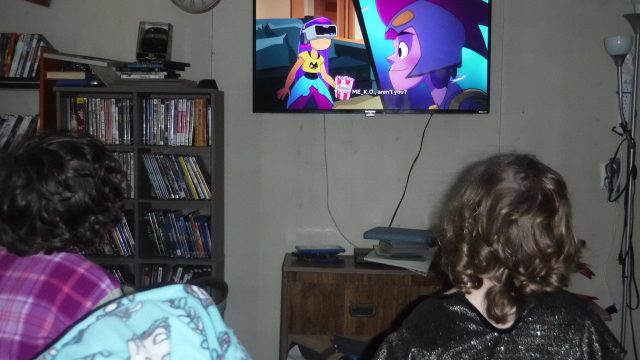I do genuinely prefer shows I can share with my kids. It may not seem that way, but I do. The rants can make for more entertaining columns—and get more feedback, because other parents often share my frustrations with those shows—but the column is a shorter experience than the watching of the show, especially if it’s one the kids really love and therefore one we watch over and over and over again. What’s best is shows I like that deal with their specific interests; a good show about giraffes or flamingos would thrill my daughter, and indeed I’ve shown her a few nature shows. And Glitch Techs hits my son’s love of video games.
Hector Nieves (Ricardo Hurtado) goes by Five, short for High Five. He has done well enough to be entered into a major video game competition held by Hinobi Software. He is competing against his idol, Mitch Williams (Luke Youngblood), and another gamer he admires, “Me-K.O.,” real name Miko Kubota (Monica Ray). Five and Miko team up and beat Mitch, but it turns out there’s a glitch, everyone’s memories get reset, and oh, gosh, Mitch has won. Except Miko is actually immune to the resetting technology and knows what Mitch did. Things happen, and Five and Miko get hired as “glitch techs” for Hinobi.
So that’s the first episode. It turns out that Hinobi Software is one of the most dangerous corporations in fiction; things escape from their games and wreak havoc in the real world all the time, and the company has a crew of employees, ostensibly the tech squad of the Hinobi store, who have high-tech gauntlets that they use to take down the glitches and wipe people’s memories. Mitch is the most experienced of them, but there are a handful just at the one store, and we know that other towns have stores and their own teams of techs.
I like Five, and I like Miko, and you’re not supposed to like Mitch. And I like that there’s a well-developed team of coworkers for them; Zahra (Zehra Fazal) is smart and cool and good at her job and basically can’t talk like a human to Five because she has a crush on him. Which I’m sure we can all sympathize with! Their boss, Phil (Scott Kreamer) reminds me of any number of my friends, who’ve gotten “old” in jobs that everyone thinks are only for kids. But why shouldn’t he still enjoy video games? And he’s good at his job, so why should he do something else?
All the games the techs have to deal with seem like you could get a real game out of them, which is not something universally true with fictional video games. There are gamers making the show, and it shows. Especially in how the characters talk about games; these aren’t stereotypical nerd characters. Not just because, you know, Five is named Hector Nieves and works in his grandparents’ taco truck. But also because they have multiple interests beyond just gaming, and they don’t all have glasses and post-nasal drip.
We also get a little bit of detail in various characters’ home lives. Five has his grandparents; his father is in jail for white-hat hacking. His grandparents are supportive enough to move their taco truck for the first time in years so that they can be there when Five is in the tournament in the first episode. Conversely, Miko’s mom is controlling. Despite Miko’s obvious skill and love of gaming, her parents deride it as a waste of time and actively sabotage her in the first episode, because they don’t consider it as important as her sisters’ hobbies. One gets the feeling that her mother dislikes Miko’s job because she believes Miko is capable of something More Important.
I mean, I identify with Miko a bit because she’s the middle child, and her Really Important Thing is ignored. I’m a middle child, and I don’t think my mom has read any of my articles for this site including ones I wrote deliberately because she liked the thing I was writing about. I may not be as good at gaming as Miko is—I’m not as good at gaming as her sisters are, and they’re both explicitly not as good as she is—but I understand “and you have to be along for the ride while we deal with your sisters’ things that don’t involve you” more than I’m going to get into here.
One of the things I believe this show teaches my kids is that you can often find something that you love that connects you with others. Also that sharing interests with people doesn’t necessarily mean you’ll like them; see also Mitch. But even though Mitch is a pain, he’s also legitimately very, very good at what he does, and that’s a valuable lesson, too; that really does happen. It teaches that your parents can hurt you by doing what they think is best, and sometimes they’re right and sometimes they’re wrong. And that right or wrong doesn’t change that you’re hurt.
Also, the scenes where the kids—I think they’re explicitly teenagers, but their ages are not ever mentioned and there’s evidence that they’re both older and younger than I think they are—do their job are just fun. They’re fighting video game characters in the real world and getting paid for it, and what’s better than that?
Help my son acquire the video games he keeps asking for; consider supporting my Patreon or Ko-fi!

